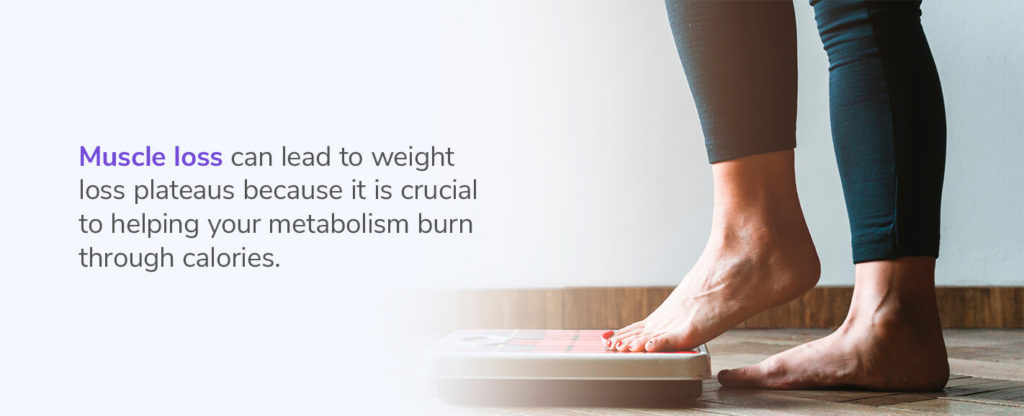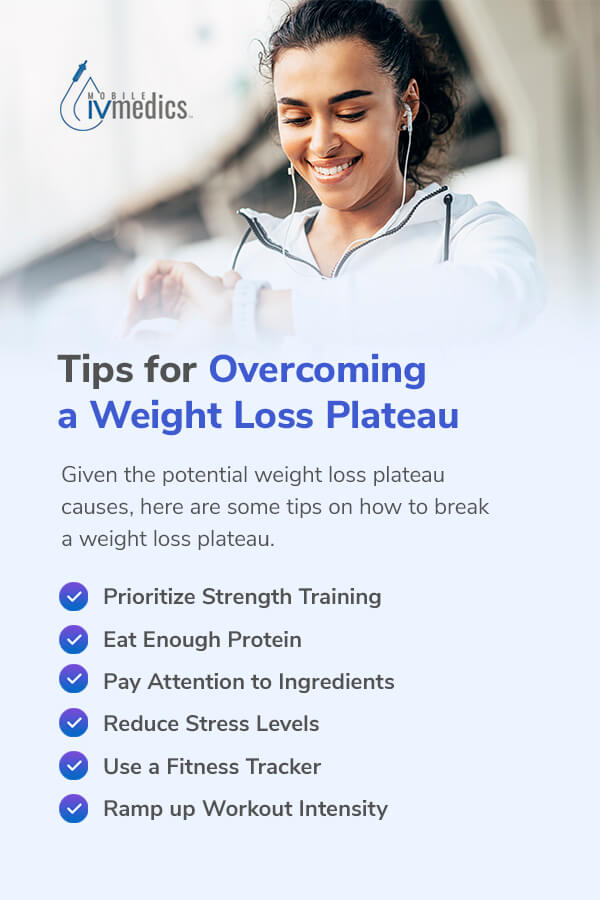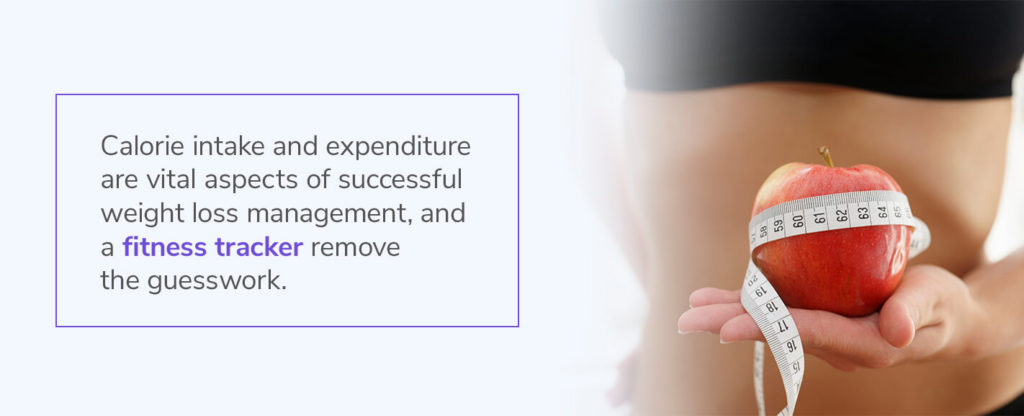When working to achieve a healthy and positive body image, there is nothing worse than the dreaded weight loss plateau. At first, with each pound you lose, your motivation and belief in yourself rise. You can already see your hard work paying off, and you begin losing weight until your ultimate goal doesn’t seem as far off as when you first started your weight loss journey. Then, a weight loss plateau hits, and you wonder what went wrong in trying to lose weight
When a weight loss plateau occurs, it is normal to feel discouraged. All that work at losing weight and then suddenly stops. The good news is that you can break a weight loss plateau to reach your ultimate goal. While you may need to adjust your weight loss approach, your hard work will get you there in time, so keep at it!
Here is some information to help you understand why you might be experiencing a weight loss plateau and what you can do to overcome it.
What Is a Weight Loss Plateau?
A weight loss plateau occurs when you stop losing weight after a period of weight loss. Weight loss plateaus occur despite continuing with dietary changes and regular physical activity. Although the ideal weight-loss journey carries on without any hiccups, getting stuck in a weight-loss rut is common. Weight loss plateaus often occur six months after starting a weight loss program, though some may occur between one to two years later.
Most people’s weight journey begins with substantial weight loss once they get a rhythm with their diet and fitness routine. When progress slows until you reach a plateau, it is easy to get discouraged and give up on your weight loss goals.
However, keep your chin up if you are experiencing a weight-loss standstill! You can overcome weight loss plateaus by tweaking your diet, exercise regimen, sleep patterns, or other lifestyle habits.
It is necessary to make changes once you find you can’t lose weight on your current diet and exercise routine. Although not the primary cause of weight loss plateaus, your body naturally adapts to specific patterns, especially with physical activity.
The reverse is also true — the more varied your workout routine is, the harder your body has to work to adapt to it. The harder your body works, the more fat you burn!
Potential Causes of a Weight Loss Plateau
There’s no one answer to what causes weight loss plateaus. Still, doctors and medical researchers have various theories and explanations explaining why weight loss plateaus occur, at least in part.
Even if those theories and explanations cannot account for all cases, they provide invaluable insight into why weight loss plateaus occur. Here are some potential causes of weight loss plateaus.

Muscle Loss
When you start losing weight, your body loses lean muscle mass without affecting your muscle strength. The amount of muscle loss that occurs with weight loss falls within 20% to 35% of your total weight loss.
Muscle loss can lead to weight loss plateaus because it is crucial to helping your metabolism burn through calories. Lost muscle mass makes your metabolism burn fewer calories and fat with less efficiency. As a result, you lose less weight.
This weight loss plateau highlights the importance of including strength training in your exercise routine. Although cardio exercises burn more calories than weight training, the best workouts for weight loss have both. Cardio helps you burn calories, while strength training ensures your metabolism burns through those calories with optimal efficiency.
Set Point Theory to Lose Weight
The set point theory presumes that your body aims for a comfortable consistency with weight. Your genetics determine this set point or weight range, as the idea goes. When you go below, your body thinks you are starving.
Thus, your metabolism works at a rate that allows your body to maintain the set point weight. Further weight loss becomes much more difficult when you hit your set point. If you gain weight after hitting your set point, try to lose weight slowly.
Doing so will allow your body to adjust to the new set weight point without reverting to the old one.
Inadequate Exercise or Diet Routines for Losing Weight
For many people, the root weight loss plateau cause is diet and exercise that doesn’t quite meet the requirements of what their body needs to keep losing weight.
Whether you’re experiencing wavering dedication or need a more robust regimen, the best solution is the age-old advice — burn more calories than you consume. To do so, you will need to track your calorie intake and the number of calories you burn during exercise.
Medical Conditions Causing Weight Loss Plateaus
In some cases, weight loss plateaus occur due to factors outside your control. Various medical conditions present obstacles to consistent weight loss or healthy weight maintenance. Some of these medical conditions include:
- Hypothyroidism: Also known as an underactive thyroid, hypothyroidism occurs when your thyroid gland does not produce enough triiodothyronine (T3) and thyroxine (T4) hormones. Since these hormones regulate your metabolism, an underactive thyroid slows down your metabolic rate. A slower metabolism means your body burns fat with less efficiency.
- Chronic inflammation: Chronic inflammation occurs when your body produces too many cytokines. Cytokines are inflammatory substances that activate your body’s immune response. These substances also interfere with insulin production and can lead to insulin resistance. In turn, insulin resistance leads to weight gain. In this way, chronic inflammation makes weight loss an uphill battle.
- Cushing’s syndrome: Cushing’s syndrome is a hormonal disorder where your body produces too much cortisol. Cortisol increases your appetite, makes your cells more resistant to insulin, and can slow down your metabolism. These factors contribute to either gaining weight or challenges with weight loss.
- Chronic stress and depression: Researchers have discovered direct links between stress and depression. Both of these conditions also create weight management challenges. When you experience stress, your body produces increased cortisol amounts. When depression occurs with chronic stress, you may have less motivation to stick with a strong workout and diet routine. At the same time, increased cortisol levels hinder weight management goals.
- Low testosterone (Low-T): Low-T is another hormonal disorder where your body does not produce enough testosterone. When your body does not generate enough testosterone, it builds muscle less efficiently and produces increased abdominal fat.
- Metabolic syndrome: Metabolic syndrome is a cluster of co-occurring medical conditions. These conditions include high blood pressure, high blood sugar, insulin resistance, excess abdominal fat, and cholesterol imbalances. Besides weight gain, metabolic syndrome increases your risk of type 2 diabetes, heart attack, and stroke.
- Polycystic ovary syndrome (PCOS): PCOS is a hormonal disorder that affects fertility in people with ovaries. This condition also causes insulin resistance, making weight gain easier.
- Type 2 diabetes: Insulin resistance is also the main symptom of type 2 diabetes. If you have type 2 diabetes, you have an increased risk of obesity.

Tips for Overcoming a Weight Loss Plateau
Given the potential weight loss plateau causes, here are some tips on how to break a weight loss plateau.
Prioritize Strength Training
Since you lose small amounts of muscle mass for each pound you shed, it is wise to prioritize strength training in your workout regimen. Strength training will help you build muscle to restore the lost muscle mass and keep your metabolism blazing through fat cells.
Eat Enough Protein
Alongside strength training, protein consumption also helps preserve muscle mass. While paying attention to calorie intake remains essential for overcoming a weight loss plateau, make sure you eat ample protein daily. Some excellent sources of protein for preserving muscle mass include:
- Eggs
- Chicken or turkey
- Greek yogurt
- Cottage cheese
- Salmon, tuna, and other types of seafood
- Tofu
- Edamame beans
- Lean beef or pork
- Chickpeas
- Brown rice
- Seeds and nuts
Pay Attention to Ingredients
Pay close attention to the ingredients in the foods you eat with your diet. Some foods may appear healthy at first glance, only to contain several preservatives hidden in the fine print. The best option for healthy weight-loss diets is prioritizing whole foods or those with simple ingredients.
Here’s a good rule of thumb for ingredient lists — it’s probably good for you if you know every ingredient. Conversely, if the ingredient list is stuffed with words that resemble something from the periodic table, that’s a red flag.
Reduce Stress Levels
Since stress increases cortisol and cortisol contributes to weight gain, it pays to reduce your stress levels by finding healthy stress management techniques. Still, reducing stress is often easier said than done. At the very least, you do not want to increase your stress levels by worrying about how to reduce stress! To that end, here are some practical and healthy ways to reduce and cope with stress:
- Stay active: Many studies show the effects of physical activity or lack thereof on stress levels. So, staying active helps you burn calories and prevent stress.
- Meditate: Meditation is one of the most effective and healthiest ways to reduce stress and promote mental wellness.
- Practice yoga: As a meditative practice, yoga is as effective and healthy for stress relief as meditation, if not more.
- Laugh often: It always feels great to experience genuine laughter. Research also shows that laughter reduces stress.
- Seek counseling: Stress often builds and compounds when we hold it in and keep to ourselves. Counseling can be a safe and helpful outlet for stress, allowing you to lay down some of your burdens and see some of your stress in a new light.
- Find creative outlets: You may find writing, painting, music, or another creative outlet helpful for managing stress. Turning your stress into an opportunity for creative expression can alter your perspective and help you find your way through stressful situations.
- Get enough sleep: Sleep quality directly influences cortisol levels. Essentially, the less you sleep, the more stress you will likely experience. Often, a stressful situation transforms from a mountain to a molehill after a good night’s rest. The opposite is also true — lack of sleep often makes the smallest choices, such as deciding what to wear, feel like a monumental decision.

Use a Fitness Tracker
Calorie intake and expenditure are vital aspects of successful weight loss management, and a fitness tracker removes the guesswork. Fitness trackers help you monitor how many calories you consume compared to how many you burn. They may also monitor your heart rate, letting you know how hard you are working and if you should increase the intensity or keep up the good work.
Ramp up Workout Intensity
Ramp up your workout intensity to tip the calorie-in-calorie-out balance in favor of calorie expenditure. While it is vital to limit your calorie intake and find healthy calorie sources, your body needs a certain amount of calories every day for proper functioning.
In that light, it is more important to find ways to increase your workout intensity than it is to find ways to cut calories up to a certain extent. As you ensure your body gets enough calories each day from healthy food sources, here are some ways to ramp up your workout intensity:
- Lengthen your walks, jogs, or runs
- Increase weight amount with strength training
- Add weights to cardio exercises
- Try high-intensity interval training (HIIT)
- Lengthen the duration of your workout
- Add jumping or sprinting intervals
- Add extra reps
- Have active rest intervals
Remember to stay within your fitness level and abilities as you increase the intensity. Overexertion or exercising with more intensity than your body can handle raises injury risk and causes more harm than good. Make sure you let your body recover after vigorous physical activity
How Mobile IV Medics Can Help
We would love to be a part of your weight loss plateau solution at Mobile IV Medics! Our IV therapy services provide your body with the nutrients it needs to lose weight safely, healthily, and effectively. Each ingredient in our IV packages is produced naturally in your body.
We have numerous available drip packages, including our Weight Loss IV Drip package. Our pharmacists customize this drip package with nutrients, vitamins, amino acids, and other ingredients to help you lose weight as efficiently as possible. Those ingredients include:
- IV fluid: Another term for IV fluid is saline, which consists of sodium chloride, water, and electrolytes. IV fluids prevent dehydration efficiently and effectively.
- Methionine inositol choline (MIC): MIC is a lipotropic compound, which means it breaks down and metabolizes fat cells in your body. Methionine is an amino acid, a substance in your body that creates proteins. Inositol is a sugar that helps with insulin control, and choline is a nutrient made in your liver similar to B vitamins. Choline helps all of your cells function correctly.
- Taurine: Taurine is an amino acid that regulates brain and heart health. It also boosts exercise and athletic performance.
- Vitamin B complex: Vitamin B complex is a mix of eight different B vitamins. This vitamin complex improves stress, mental wellness, energy, and cognitive health.
- Vitamin B12: Vitamin B12 is essential for proper metabolic functioning and countless other functions in your body. It boosts your energy, increases mental clarity, and helps with blood cells, DNA, and nerve production.
- Vitamin C: Researchers have linked healthy vitamin C levels with strong weight management abilities. Vitamin C is also important for energy levels and for reducing stress.

Contact Us Today
If you’ve hit a roadblock in your weight loss journey and feel you cannot lose weight anymore, we’d love to help you out at Mobile IV Medics. Our IV therapy services have helped many individuals with weight loss efforts. We also provide 100% mobile services, so we bring IV therapy to your door! Contact us today to learn more about how we can help you overcome your weight loss plateau.
Sources:
- https://www.ncbi.nlm.nih.gov/pmc/articles/PMC4135489/pdf/ajcn1003787.pdf
- https://www.canr.msu.edu/news/the_benefits_of_adding_cross_training_to_your_exercise_routine
- https://www.ncbi.nlm.nih.gov/pmc/articles/PMC5421125/
- https://www.ncbi.nlm.nih.gov/pmc/articles/PMC6039924/
- https://mobileivmedics.com/fast-ways-reduce-inflammation/
- https://www.ncbi.nlm.nih.gov/pmc/articles/PMC6832997/
- https://www.ncbi.nlm.nih.gov/pmc/articles/PMC6566799/
- https://mobileivmedics.com/iv-treatment-eases-stress/
- https://files.eric.ed.gov/fulltext/EJ1202177.pdf
- https://www.ncbi.nlm.nih.gov/pmc/articles/PMC4895748/
- https://www.ncbi.nlm.nih.gov/pmc/articles/PMC6630857/
- https://pubmed.ncbi.nlm.nih.gov/32393092/
- https://www.ncbi.nlm.nih.gov/pmc/articles/PMC5836011/
- https://www.ncbi.nlm.nih.gov/pmc/articles/PMC4688585/
- https://mobileivmedics.com/can-iv-therapy-improve-sleep-quality/
- https://mobileivmedics.com/running-exercise-recovery-tips/
- https://mobileivmedics.com/iv-therapy-support-weight-loss/
- https://mobileivmedics.com/what-is-iv-therapy/
- https://mobileivmedics.com/treatment/
- https://mobileivmedics.com/treatment/weight-loss/
- https://mobileivmedics.com/electrolytes-and-the-body/
- https://ods.od.nih.gov/factsheets/Carnitine-HealthProfessional/
- https://www.ncbi.nlm.nih.gov/books/NBK209047/
- https://www.ncbi.nlm.nih.gov/pmc/articles/PMC8152067/
- https://mobileivmedics.com/what-is-iv-b-complex-good-for/
- https://mobileivmedics.com/what-is-iv-b12-good-for/
- https://pubmed.ncbi.nlm.nih.gov/15930480/#:~:text=Vitamin%20C%20status%20is%20inversely,resistant%20to%20fat%20mass%20loss.
- https://mobileivmedics.com/what-is-iv-vitamin-c-good-for/





